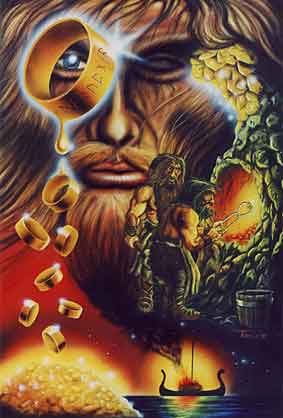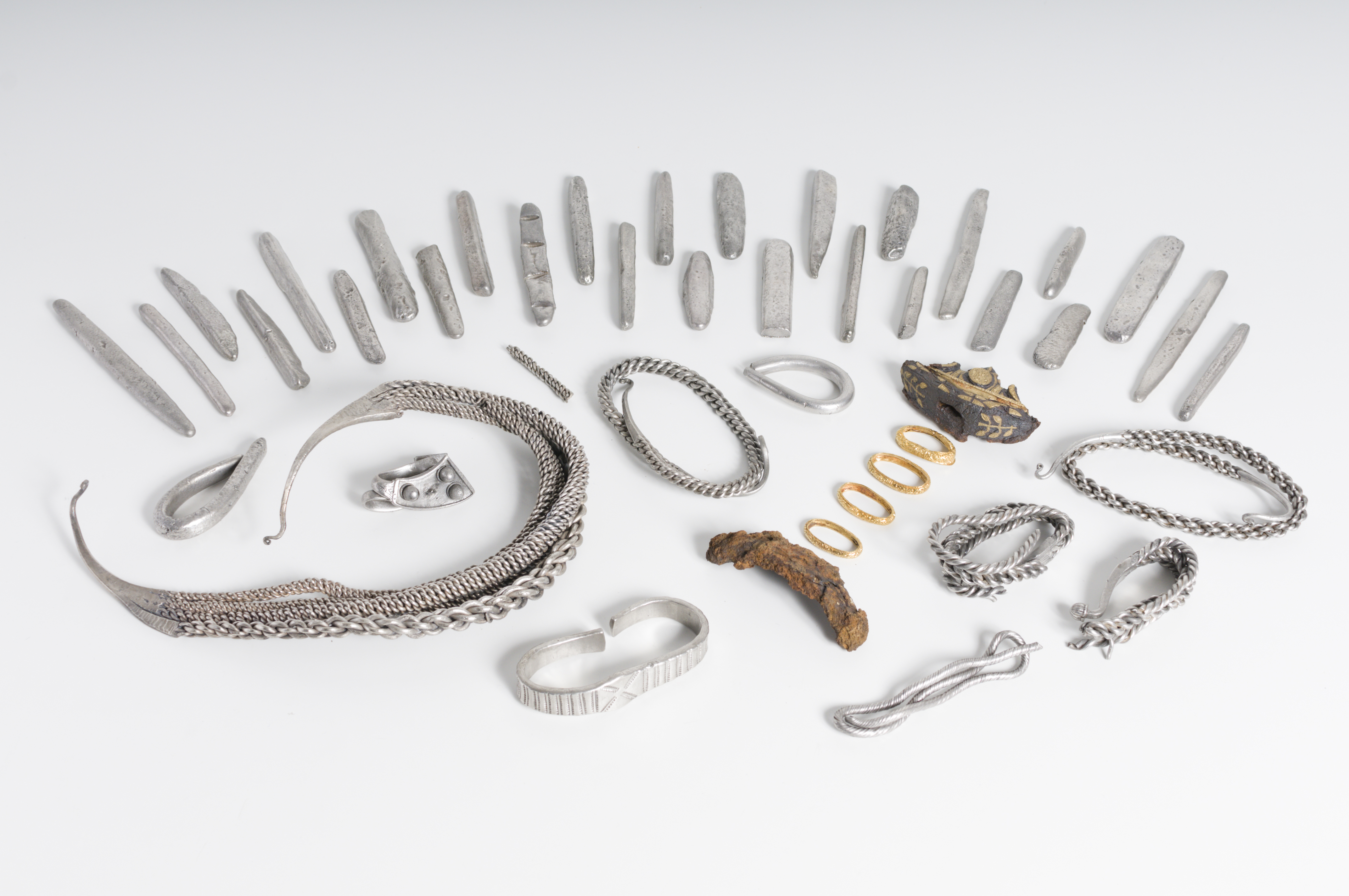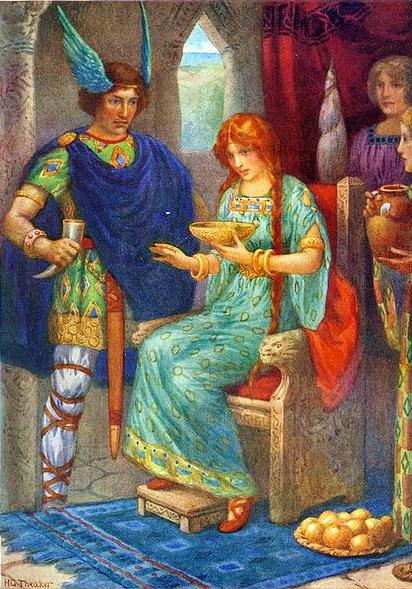|
Draupnir
In Norse mythology, Draupnir (Old Norse: , "the dripper"Orchard (1997:34).) is a gold ring possessed by the god Odin with the ability to multiply itself: Every ninth night, eight new rings 'drip' from Draupnir, each one of the same size and weight as the original. Draupnir was forged by the dwarven brothers Brokkr and Eitri (or Sindri). Brokkr and Eitri made this ring as one of a set of three gifts which included Mjöllnir and Gullinbursti. They made these gifts in accordance with a bet Loki made saying that Brokkr and Eitri could not make better gifts than the three made by the Sons of Ivaldi. In the end, Mjöllnir, Thor's hammer, won the contest for Brokkr and Eitri. Loki used a loophole to get out of the wager for his head (the wager was for Loki's head only, but he argued that, to remove his head, they would have to injure his neck, which was not in the bargain) and Brokkr punished him by sealing his lips shut with wire. The ring was placed by Odin on the funeral pyr ... [...More Info...] [...Related Items...] OR: [Wikipedia] [Google] [Baidu] |
Rings In Germanic Cultures
A prominent position is held by rings in early Germanic cultures, appearing both in archaeology throughout areas settled by Germanic peoples, and in textual sources discussing their practices and beliefs. They are notably associated with the related aspects of wealth, being used as forms of currency in the Early Medieval Period, and swearing sacred oaths, often dedicated to, or witnessed by, the List of Germanic deities, gods. The sacrality of rings is reflected in Germanic mythology and ring bestowal held a central role in maintaining functional relationships between rulers and their retinues. The cultural roles of rings continued to varying extents during and after the Christianisation of the Germanic peoples, such as in gift-bestowal and oath-swearing. Archaeological record Arm ring, Arm, Finger ring, finger and neck rings dating to the Early Medieval Period have been found in hoards throughout Northern Europe, such as the Spillings Hoard in Gotland and the Silverdale Hoard i ... [...More Info...] [...Related Items...] OR: [Wikipedia] [Google] [Baidu] |
Gerðr
In Norse mythology, Gerðr (Old Norse: ; "fenced-in"Orchard (1997:54).) is a jötunn, Æsir, goddess, and the wife of the god Freyr. Gerðr is attested in the ''Poetic Edda'', compiled in the 13th century from earlier traditional sources; the ''Prose Edda'' and ''Heimskringla'', written in the 13th century by Snorri Sturluson; and in the poetry of skalds. ''Gerðr'' is sometimes modernly anglicized as Gerd or Gerth. In both the ''Poetic Edda'' and the ''Prose Edda'', Freyr sees Gerðr from a distance, becomes deeply lovesick at the sight of her shimmering beauty, and has his servant Skírnir go to Jötunheimr (where Gerðr and her father Gymir (father of Gerðr), Gymir reside) to gain her love. In the ''Poetic Edda'' Gerðr initially refuses, yet after a series of threats by Skírnir she is forced to yield. In the ''Prose Edda'', no mention of threats is made. In both sources, Gerðr agrees to meet Freyr at a fixed time at the location of Barri and, after Skírnir returns with Ger ... [...More Info...] [...Related Items...] OR: [Wikipedia] [Google] [Baidu] |
Norse Dwarves
A dwarf () is a type of supernatural being in Germanic folklore. Accounts of dwarfs vary significantly throughout history. They are commonly, but not exclusively, presented as living in mountains or stones and being skilled craftsmen. In early literary sources, only males are explicitly referred to as dwarfs. However, they are described as having sisters and daughters, while male and female dwarfs feature in later saga literature and folklore. Dwarfs are sometimes described as short; however, scholars have noted that this is neither explicit nor relevant to their roles in the earliest sources. Dwarfs continue to feature in modern popular culture, such as in the works of J. R. R. Tolkien and Terry Pratchett, where they are often, but not exclusively, presented as distinct from elves. Etymology and meaning Etymology The modern English noun ''dwarf'' descends from . It has a variety of Cognate, cognates in other Germanic languages, including Old Norse ''dvergr'', Old Frisian ''dw ... [...More Info...] [...Related Items...] OR: [Wikipedia] [Google] [Baidu] |
Brokkr
In Norse mythology, Brokkr (Old Norse: , "the one who works with metal fragments; blacksmith", anglicized Brokk) is a dwarf, and the brother of Eitri or Sindri. According to ''Skáldskaparmál'', Loki had Sif's hair, Freyr's ship Skíðblaðnir and Odin's spear Gungnir fashioned by the Sons of Ivaldi. Loki boasted greatly of all the things that the Sons of Ivaldi could create. He also boasted that the other dwarves could not create anything beautiful or useful. Brokkr, who was in Asgard at the time, declared that his brother Eitri could make things far more beautiful and useful than the Sons of Ivaldi. Brokkr bet his head with that of Loki that his brother Eitri could make things with better craftsmanship than Skíðblaðnir or Gungnir. While Eitri used magic in a forge that was extremely hot, Brokkr worked the bellows so that the fire would not cool down nor get too hot for the magic. While making the boar Gullinbursti, a gadfly, often thought to be Loki himself, came and bi ... [...More Info...] [...Related Items...] OR: [Wikipedia] [Google] [Baidu] |
Baldr
Baldr (Old Norse also Balder, Baldur) is a god in Germanic mythology. In Norse mythology, he is a son of the god Odin and the goddess Frigg, and has numerous brothers, such as Thor and Váli. In wider Germanic mythology, the god was known in Old English as , and in Old High German as , all ultimately stemming from the Proto-Germanic theonym ('hero' or 'prince'). During the 12th century, Danish accounts by Saxo Grammaticus and other Danish Latin chroniclers recorded a euhemerized account of his story. Compiled in Iceland during the 13th century, but based on older Old Norse poetry, the ''Poetic Edda'' and the ''Prose Edda'' contain numerous references to the death of Baldr as both a great tragedy to the Æsir and a harbinger of Ragnarök. According to '' Gylfaginning'', a book of Snorri Sturluson's Prose Edda, Baldr's wife is Nanna and their son is Forseti. Baldr had the greatest ship ever built, '' Hringhorni'', and there is no place more beautiful than his hall, Breida ... [...More Info...] [...Related Items...] OR: [Wikipedia] [Google] [Baidu] |
Skírnir
In Norse mythology, Skírnir (Old Norse" ; "bright one") is the god Freyr's messenger and vassal. He appears in both the Poetic and Prose Eddas. Attestations ''Poetic Edda'' In the Eddic poem '' Skírnismál'', Skírnir is sent as a messenger to Jötunheimr to conduct lovesick Freyr's wooing of the giantess Gerðr on condition of being given Freyr's powerful sword as a reward. Skírnir begins by offering Gerðr 11 golden apples (or apples of eternal life, in a common emendation), which Gerðr rejects, adding that she and Freyr will never be together as long as they live. He next offers Gerðr a ring that produces eight more gold rings every ninth night. Gerðr responds that she is not interested in the ring for she shares her father Gymir's property, and he has no lack of gold. Skírnir then turns to a series of threats. He first threatens to cut Gerðr's head from her neck and then threatens her father's life. He next tells Gerðr that she will sit on an eagle's mou ... [...More Info...] [...Related Items...] OR: [Wikipedia] [Google] [Baidu] |
Hermóðr
Hermóðr (Old Norse: , " war- spirit";Orchard (1997:83). anglicized as Hermod) is a figure in Norse mythology, a son of the god Odin and brother of Baldr. Attestations ''Prose Edda'' Hermóðr appears distinctly in section 49 of the '' Prose Edda'' book '' Gylfaginning''. There, it is described that the gods were speechless and devastated at the death of Baldr, unable to react due to their grief. After the gods gathered their wits from the immense shock and grief of Baldr's death, Frigg asked the Æsir who amongst them wished "to gain all of her love and favor"Byock (2005:66). by riding the road to Hel. Whoever agreed was to offer Hel a ransom in exchange for Baldr's return to Asgard. Hermóðr agreed to this and set off with Sleipnir to Hel. Hermóðr rode Odin's horse Sleipnir for nine nights through deep and dark valleys to the Gjöll bridge covered with shining gold, the bridge being guarded by the maiden Móðguðr 'Battle-frenzy' or 'Battle-tired'. Móðguðr told ... [...More Info...] [...Related Items...] OR: [Wikipedia] [Google] [Baidu] |
Sons Of Ivaldi
In Norse mythology, the Sons of Ivaldi ( Norse: ''Ívaldasynir'') are a group of dwarfs who fashion Skíðblaðnir, the flying ship of Freyr, Gungnir, the spear belonging to Odin, as well as the golden hair for Sif to replace the hair that Loki had cut off. According to ''Skáldskaparmál'', after these objects were created Loki made a bet with a dwarf, Brokkr, that his brother Eitri (or Sindri) would not be able to craft items to match the quality of those displayed by the sons of Ivaldi. This contest resulted in the creation of the boar of Freyr ( Gullinbursti), the ring of Odin ( Draupnir) and the hammer of Thor ( Mjolnir), which were judged by the gods A deity or god is a supernatural being considered to be sacred and worthy of worship due to having authority over some aspect of the universe and/or life. The ''Oxford Dictionary of English'' defines ''deity'' as a God (male deity), god or god ... to be even more wondrous than the others. Thus, Brokkr had won the ... [...More Info...] [...Related Items...] OR: [Wikipedia] [Google] [Baidu] |
Sindri (mythology)
In Norse mythology, Sindri (Old Norse: , from , "slag") is the name of both a dwarf and a hall that will serve as a dwelling place for the souls of the virtuous after the events of Ragnarök. Sindri is also referred to as Eitri, the brother of Brokkr. A dwarf ''Völuspá'' (37) mentions "a hall of gods, of the lineage of Sindri" located northward, in Niðavellir. There are several reasons to think that Sindri is a dwarf:Lindow 2002. his name is related with forging and the hall is made of gold (dwarves are said to be skillful smiths), the location of the hall is Niðavellir, which possibly means "dark fields" (dwarves live away from the sunlight). In the ''Poetic Edda'', Sindri's name is Eitri.Acker 2002. The names of the dwarves are not given in the three other main manuscripts of the ''Prose Edda'' but in the ''Codex Regius'', an unknown author added more recently the names of Brokkr and Sindri. Despite the difference in names, the story of the dwarf brothers and the creation ... [...More Info...] [...Related Items...] OR: [Wikipedia] [Google] [Baidu] |
Odin
Odin (; from ) is a widely revered god in Norse mythology and Germanic paganism. Most surviving information on Odin comes from Norse mythology, but he figures prominently in the recorded history of Northern Europe. This includes the Roman Empire's partial occupation of Germania ( BCE), the Migration Period (4th–6th centuries CE) and the Viking Age (8th–11th centuries CE). Consequently, Odin has hundreds of names and titles. Several of these stem from the reconstructed Proto-Germanic theonym ''Wōðanaz'', meaning "lord of frenzy" or "leader of the possessed", which may relate to the god's strong association with poetry. Most mythological stories about Odin survive from the 13th-century ''Prose Edda'' and an earlier collection of Old Norse poems, the ''Poetic Edda'', along with other Old Norse items like '' Ynglinga saga''. The ''Prose Edda'' and other sources depict Odin as the head of the pantheon, sometimes called the Æsir, and bearing a spear and a ring. Wid ... [...More Info...] [...Related Items...] OR: [Wikipedia] [Google] [Baidu] |
Eitri
In the Old Norse religion, Eitri (Old Norse: ; or Sindri) is a dwarf and the brother of Brokkr. According to ''Skáldskaparmál'', when Loki had Sif's hair, Freyr's ship Skidbladnir and Odin's spear Gungnir fashioned by the Sons of Ivaldi, he bet his own head with Brokkr that Eitri would not have been able to make items that matched the craftsmanship of those mentioned above. Eitri began working in his furnace while his brother was working the bellows, but a fly (sometimes thought to be Loki himself) began stinging Brokkr, trying to stop him and spoil the items. Eitri succeeded in making the golden boar Gullinbursti, the golden ring Draupnir In Norse mythology, Draupnir (Old Norse: , "the dripper"Orchard (1997:34).) is a gold ring possessed by the god Odin with the ability to multiply itself: Every ninth night, eight new rings 'drip' from Draupnir, each one of the same size and wei ..., and the hammer Mjöllnir that made his brother win the bet, even if its handle wa ... [...More Info...] [...Related Items...] OR: [Wikipedia] [Google] [Baidu] |



